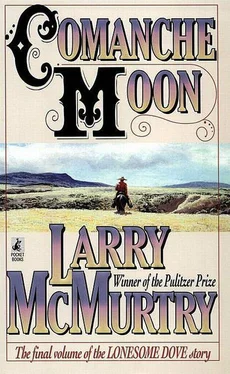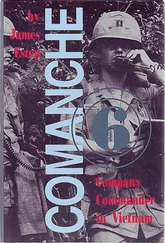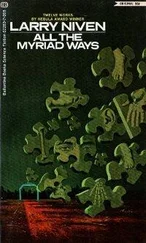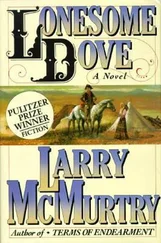But now Mr. Gus was concerning him a little.
What did he mean, whatever happened to him? It sounded as if he might be intending to leave, which was startling and upsetting. Of all the rangers only Pea Eye, a young man like himself, had been as kind to him as Mr. Gus.
"I expect you be seeing for yourself what a good job I do, Captain," Deets said. He tried to pick his ^ws carefully, for the matter clearly meant a lot to Mr. Gus.
"But if I ain't here to see it for myself, you tend these graves anyway," Gus said, with force in his voice suddenly. "You make 'em pretty anyway, Deets, even if I'm dead and in a grave myself." It had suddenly come to Augustus that he might die without ever seeing Clara again--or, even worse, Clara herself might die before they could ever have another moment together with one another. It was a terrible thought to think, and yet men and women died every day on the frontier; and Nebraska, where Clara had gone, was no less a frontier than Texas. Thirty people, all of them alive when he and Call left Austin, lay buried under the freshly turned earth just before him.
"I ain't guaranteed tomorrow--y ain't either," he told Deets. "If I should fall I wouldn't want my friend to have to be ... worrying about these graves not being tended." Deets had never heard Mr. Gus speak so.
He realized he had been given a solemn responsibility.
"I'll be seeing to the graves, Captain," he said.
Mr. Gus nodded. He was looking away; it was as if he were thinking of a far place, a place well distant from the little graveyard outside of Austin. He nodded, but he didn't speak.
Deets thought it might be best just to leave him alone, to do his looking away. He walked out of the graveyard, put his hat back on, and began to inspect some of the first spring flowers, to see if any of them might do for prettying up the two graves.
Maggie now seldom went out. The baby was growing inside her, its kicks stronger every day.
Even with her coat on it was obvious to everyone who saw her that she was with child.
Fortunately her room was light, with a good south breeze blowing through it most of the time. Woodrow had started taking most of his meals with her, which meant that she did have to go out and shop a little in the market.
Since the raid beef had become scarce and pricey. There were plenty of cattle but few hunters bold enough to go into the brush country to slaughter them, for fear of encountering Comanches.
Fortunately, Woodrow liked goat, which was available and cheap. Sometimes Gus McCrae would come up and eat with him--he was always tipsy, it seemed.
"I fear my partner will end up a drunkard," Woodrow said, one night after Gus had left.
They stood by the window and watched him make straight for a saloon.
"That's because of Clara," Maggie said. "He had his heart set on her." "Yes, but she's gone," Call said. "He needs to let it go and find himself another girl." "He can't," Maggie said. "Some folks can't just bend their feelings that way." "Well, he ought to try," Woodrow said.
"There's plenty of girls that would make him a decent wife if he'd just give them a chance." Then he picked up his rifle and left to walk the river, as he did most every night. He scarcely lingered with Maggie ten minutes now, after taking his meal; when he returned it would be nearly dawn. He would merely sleep an hour or two with her, before going down to the rangers.
Each night's departure left Maggie feeling empty and sad. She wanted to say to him what he had just said about the girls Gus might marry: I could make you a decent wife, if you'd just give me the chance. Already, she tried to treat Woodrow as she would treat a beloved husband, yet all it seemed to get her was the hastiest attentions. The thing that seemed to please him most was that she kept his clothes clean and nicely pressed. As the weather grew warmer, Maggie sometimes felt faint, ironing in the heat, and yet she kept on because Woodrow liked to dress neatly and his pleasure in wearing well-placed clothes was a kind of bond they had, a stronger one than their pleasure even. Anyway the pleasure had become hasty and more and more intermittent. Woodrow seemed to feel that much indulgence in the carnal appetites would be medically inadvisable; or perhaps he was merely put off by her swelling body. He withdrew and walked the river; Maggie felt sad, but continued to do her best.
The baby that was so visibly there inside her she had given up mentioning at all. That she was pregnant was a fact of their existence, yet a fact they both ignored. Maggie longed for a good chance to talk to Woodrow about the baby; but he was careful in his speech and never gave her one.
Best wait, she thought--best wait until it's here. Her hope was that once the child was born Woodrow would see it and take to it. In her daydreams she imagined him pleased by the little child, so pleased that he would want everybody to know he was its father. And yet, at night, alone, with Woodrow gone, she couldn't keep herself from wondering if it would really be that way. One day she would be hopeful, the next day despairing. She could well understand why Gus McCrae had turned to drink, from missing Clara Forsythe, now Clara Allen. Maggie missed her too. Although circumstance had not permitted much conversation to pass between them, Maggie felt that Clara liked her.
Sometimes, sweeping the boardwalk in front of the store, Clara would look up at Maggie's window and smile and wave. When some small need took Maggie into the store, Clara was invariably friendly and welcoming. Knowing that Maggie had a yearning for fine goods, gloves or shoes often well beyond her purse, Clara would sometimes mark a little off an item, so that Maggie could have at least a few things that pleased her.
Having Clara there broke the loneliness; now there was no one with such a fine spirit who might break it. Maggie had once talked to Pearl Coleman now and then, but since the raid Pearl herself had become too despondent to chatter in the light way she once had. Maggie saw her almost every day, in the market, but Pearl barely responded to her hello. From being an aggressive customer, willing to haggle tirelessly and loudly over the price of a pepper or a squash, Pearl had become indifferent, merely raking a few foodstuffso into her basket and paying the price without dispute.
Seeing Pearl Coleman, a woman who had always been cheerful and well able to take care of herself, so despondent made Maggie reflect on how precarious life was, in such a place. Thirty people had lost their lives, and several women had had their marriages destroyed by the rapes they endured; most of the children had stopped going to school for fear that the Indians would come back and take them, and the men were nervous about venturing much beyond the outskirts of Austin.
Maggie herself felt like going to a safer place-- San Antonio, perhaps, or one of the towns on the coast. But she knew that if she moved she would lose all hope of marriage to Woodrow Call. The rangers were quartered in Austin and he had been promoted to captain. He would not be likely to leave.
One good thing about the promotion was that Woodrow had started giving her six dollars a month toward her housekeeping expenses.
"Woodrow, what's this for?" Maggie asked, very startled, the first time he gave her the money.
"Take it--it will be easier for you to make ends meet," Call said. The fact was, he lived frugally and seldom spent all his salary; a factor in his modest prosperity was that Maggie fed him several meals a week and looked after his laundry. Nobody gave her the food she served him, and she could scarcely do much whoring with her belly so swollen. He felt that he was an expense Maggie could ill afford. Mainly he would just put the money on the table, or by the cupboard; often he would leave it at night, before he left to walk the river.
Читать дальше












